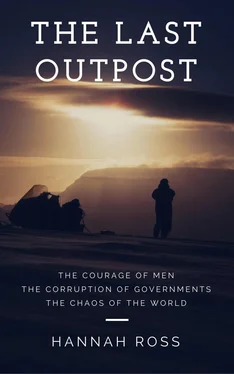He got up and carefully filed all the papers on the Anai back into place. These gave him dry information, but not the knowledge he sought. The latter could only be obtained in one manner — in going back to the valley. From now on, he realized, the place would pull him like a magnet. He would always want to go there again.
* * *
Come morning, he had to put the Anai from his mind for a while, as his regular duties made demands on him. After a quick breakfast, he presented himself at Lindholm’s office, and spent the morning holed up inside with Lindholm and Nash, observing them at work and, occasionally, taking Lindholm’s place, as he would soon be expected to do full-time.
“There are delays with some of the shipments,” Nash reported. “Europe is in turmoil, so canned salmon from Norway will not be making its way to New Zealand anytime soon.”
“We’ll do without canned salmon,” Lindholm said, “but I’d like to know what the world is about. Some of my relatives in the Old Country are thinking of emigrating to the States, but visas are hard to obtain.” By Old Country, Scott realized he meant Sweden.
“Maybe we should order extras of anything we can get right now,” Scott put in to his own surprise. “Just in case there are shortages of other things later on. Not just food, either. Medicines and supplies for the hospital, fuel… anything we can think of.”
“What’s that, some sort of doomsday prep strategy?” Victor Nash spoke up. He sounded condescending.
“No, no, Victor, my boy,” Lindholm said. “Buck is right. These are unstable times, and though almost anything is obtainable if you have enough money, prices are rising. That Norwegian salmon, I could have ordered it by way of China, but I’m not prepared to shell out the dough.”
“The hospital is overstocked as it is,” Nash argued. “Many medicines are past their due date. As for fuel, there are the wind turbines, and in winter our energy needs drop anyway, because the population is less than a quarter of what it is now.”
“If no medicines at all are to be obtained, having a stock past its due date is better than no stock at all,” Scott didn’t relent. He saw Nash roll his eyes.
“But that’s wasting our budget because of some remote possibility of shortages in view. Why should it happen?”
Scott shrugged. “I don’t know. We live in turbulent times.”
Victor Nash looked triumphant. “I was right, then — you are a doomsday prepper!”
“I wouldn’t be so quick to dismiss the notion, Victor,” Lindholm said. “Remember how two years ago there was a shortage of aspirin? We didn’t quite run out, but the clinic had to stretch its supplies by giving ibuprofen instead when they could.”
Nash pursed his lips. “It’s not my decision to make, after all. You’re the boss, Anders — or, to be precise, you are the boss now,” he looked at Scott.
“Don’t give us that crap, Victor,” Lindholm said placidly. “No one is dismissing your opinion. Now, if we go over our energy expenditure charts from the past winter…”
The charts, records, logs and order forms took the better part of the morning, and around noon Nash declared that he’s going off for lunch and left the office.
“You go ahead too, young man,” Lindholm told Scott. “As far as I recall, it’s supposed to be turkey pot pie today.”
Lindholm looked in no hurry himself, however, so Scott lingered. The Swede opened a thermos, and a small cloud of steam rose up, along with the aroma of black coffee. He poured the coffee into two mugs, adding a generous drop of Aquavit to his. Scott declined the extra drop, and drank his coffee plain and unsugared, with just a pinch of creamer.
“Don’t let Nash put you off,” Lindholm said. “He’s a reasonable fellow, but very conservative. He’s used to how things are run, and won’t stir from it one inch if he can help it.”
Scott nodded. Truth be told, he had forgotten all about Nash as soon as the man had stepped out of the door.
“Actually, I have been thinking about the Anai. I just can’t put them out of my mind.”
Something in Lindholm’s eyes grew softer. “It would have been strange if you could,” he remarked. He took out a packet of biscuits, dipped one in his coffee, and offered another to Scott.
“I spent the evening before reading all I could about them. I have never been so fascinated in my life. Their culture, their language, their origin — it is all a great mystery. Any scientist would have given half his life to unlock it.”
“It will be done eventually, I believe. But we have to proceed with caution. Over-analyzing the Anai might disrupt the very culture we are so keen on preserving.”
“Still,” Scott looked down for a moment, and ran a finger along the rim of his coffee cup. “I’ve been thinking — this deliberate sheltering of the Anai from modern civilization… isn’t there something patronizing in it? Shouldn’t they be given options and information and education, and left to decide for themselves?”
Lindholm tilted his head sideways and thought about it for a moment. “If it were to happen,” he said, “the outcome would be predictable. The lure of modern civilization is too strong. The Anai would be tempted out of their valley paradise, and in a generation or two their harmonious and peaceful existence would be tainted by satellites, generators, modern clothing, modern food, and the dissatisfied rush that is the unfortunate lot of ninety-nine percent of civilized humans. Think of all the primitive peoples of our country, Buck. The First Nations, the magnificent civilizations of Central America and the Andes — they all collapsed as soon as they confronted the European, so destructive our touch had been. The same happened in Australia, New Zealand, and anywhere you can think of.”
“That was different. At that time in history, it was all about squabbles over land, which won’t happen here. Nobody would dare to claim the Anai Valley, and they would be protected by the laws of indigenous people, not barbarously destroyed like the First Nations were in America to make room for settlers.”
“The result is much the same, though. Even when the trend was reversed, and governments gave grants for the preservation of indigenous culture and language, only the losers and the good-for-nothing turds stayed on the reservations. Even in my native country, the Sami people abandoned reindeer herding, though it was a province reserved specifically for them. They moved to cities, went to universities, earned money and strove to carve out a thicker slice of the pie for themselves.”
“Well, that is understandable, isn’t it? People are seeking to improve their quality of life.”
“But what is quality of life, Buck? The incessant madness of the rat race, where nothing is never enough? The non-stop flow of useless information through dozens of media channels, so that one is never to have a moment of peace? The degenerative diseases of modern countries, originated in over-processed food and sedentary lifestyle? Once a culture is lost, it cannot be regained by artificial means. And such a loss is tragic.”
“You are speaking like an anthropologist. I’m speaking on behalf of the individual. If I were born on a reservation, I would want to break out, for wider options, better education, better medical care… say, if an Anai person is sick or injured, and we know of it, and have the means of treating them quickly and efficiently here at the station hospital, can we do that?”
“When you get to know the Anai a little better, you will find out that they have their own traditional medicine, and in many cases it is more effective than ours.”
“Yes, but hypothetically? Suppose one needs emergency care? Can they be flown to the hospital here?”
Читать дальше












